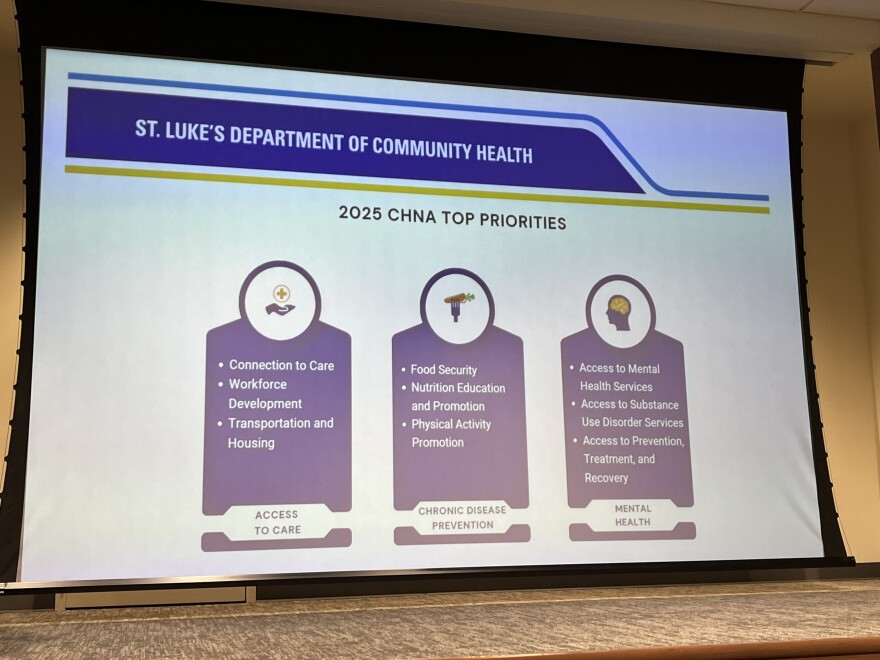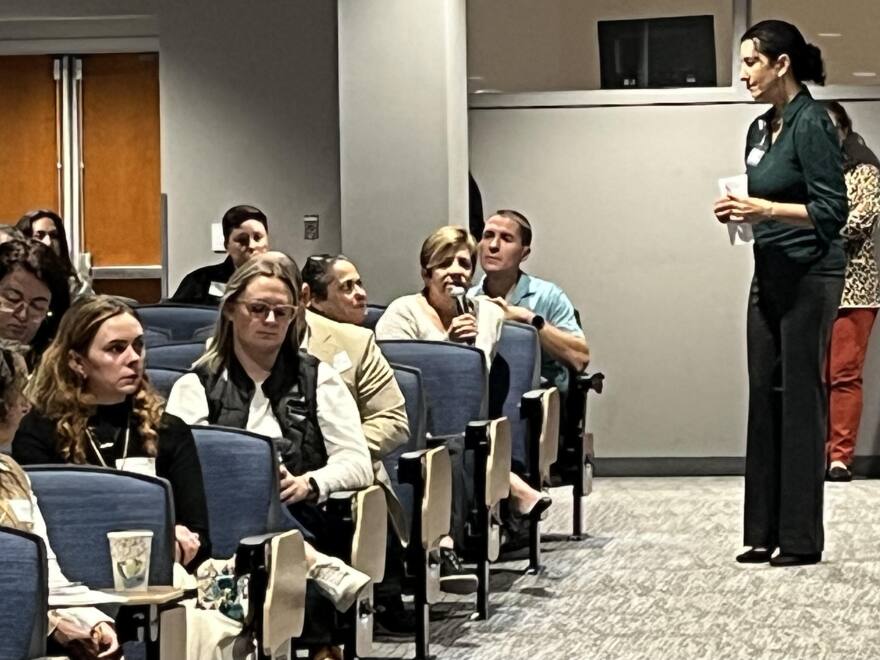ALLENTOWN, Pa. — The data screamed out a word that reverberates throughout the lives of many residents of the Lehigh Valley: Help!
The findings from St. Luke’s University Health Network’s recently completed triennial Community Health Needs Assessment revealed a host of medical-related conditions and concerns of Allentown residents.
The hospital network made the latest presentation of its findings and a community discussion Thursday to St. Luke’s Allentown & Sacred Heart hospitals at its Sacred Heart auditorium.
The primary and secondary data was collected in several ways, including through key informant interviews, community forums involving stakeholders who spoke on behalf of those they serve.
Another data collection was made through a survey of nearly 3,000 in Allentown and more than 15,000 across the St. Luke’s network.

St. Luke’s has identified what it deems the top three priorities: Access to care, chronic disease prevention and mental health.
“The goal of the assessment is to identify critical health disparities faced by populations within St. Luke’s service areas,” said Rajika Reed, St. Luke’s vice president of community health said at the presentation.
“The assessments reflect health priorities identified by community stakeholders, hospital professionals and public health experts.”
Troubling data
The 90-minute presentation was the fifth of eight such events that have been held or are scheduled throughout the Greater Lehigh Valley by St. Luke’s.
“As we share the results of this assessment, we want to ensure everyone in Allentown has easy access to care."Bill Moyer, west region president, St. Luke’s Allentown campus.
“As we share the results of this assessment, we want to ensure everyone in Allentown has easy access to care,” said Bill Moyer, west region president of St. Luke’s Allentown campus.
“It’s about removing barriers and fostering relationships, both young and old. Our mission is rooted in service to the communities we call home.”
As part of the Patient Protection and Affordable Care Act, nonprofit hospitals are required to conduct a CHNA every three years to maintain tax-exempt status under section 501(c)(3) of the U.S. Internal Revenue Code.
Other findings from the study showed challenges in transportation and housing, food insecurity, lifestyle diseases and obesity.
Findings regarding access to care identified a disparity between the insured and uninsured.
Some 92.5% of respondents who have health insurance visited a doctor in the past year, while just 61.6% of those uninsured did.
The reasons for missed appointments ranged from high costs, services uncovered by insurance and failure to get an appointment.
The data for chronic disease prevention was just as troubling.
Forty percent of respondents reported having high blood pressure, while 30% reported having high cholesterol.
Eight-two percent of those ages 45-plus reported having at least one chronic disease.
Less than 7% said they eat five or more servings of fruits and vegetables per day.
Overweight, poorly fed
Most alarming was data showing just under 77% reported being overweight or obese. Of Hispanic respondents, 82% percent reported being overweight or obese.
“Food insecurity is connected to chronic disease,” said Rosemarie Lister, St. Luke’s senior network director of community health.
“We learned that people just don’t have enough to eat. Not only that, but they don’t have enough healthy food to eat.”

Data showed 35% meet standards for ALICE, an acronym for Asset Limited Income Constrained Employed, meaning they make too much to qualify for public assistance, but are unable to afford a basic, county-specific budget for essentials like housing, food, health care and transportation.
St. Luke’s partners with the Rodale Institute Organic Farm, food pantries, United Way school partnerships, Meals on Wheels and Second Harvest Food Bank to address the shortfall.
St. Luke’s also sponsors an Older Adult Meals Program, which offers free healthy meals to those 65 and older.
“Food,” Lister said, “is the most commonly searched term in this region.”
'They need our help'
Most startling, Moyer said, was the data detailing mental health.
Fifty-four percent of respondents cited mental health as a top priority in the community.
Thirty-six percent of students in Lehigh County reported feeling sad or depressed most days last year.
“There was an increase in mental health concerns from when we did our last data cycle three years ago. There is a growing need for more mental health services. We’re just trying to keep up with that need."Bill Moyer, west region president of St. Luke’s Allentown campus
Eighteen percent of respondents reported at least one binge drinking day last month.
Twenty-two percent of children in the county reported drinking alcohol once.
Substance abuse last year claimed 35 county residents.
“There was an increase in mental health concerns from when we did our last data cycle three years ago,” Moyer said. “There is a growing need for more mental health services.
“We’re just trying to keep up with that need, through primary care offices, our community health centers and federally qualified health centers.
"We’re taking some of those services out into the community.”
St. Luke’s ranks fifth of 322 U.S. in community benefits, which is welcome news for challenged residents.
Moyer identified the data as an important step toward addressing residents’ needs.
“We look forward to turning these insights into action,” he said. “They need our help.”


